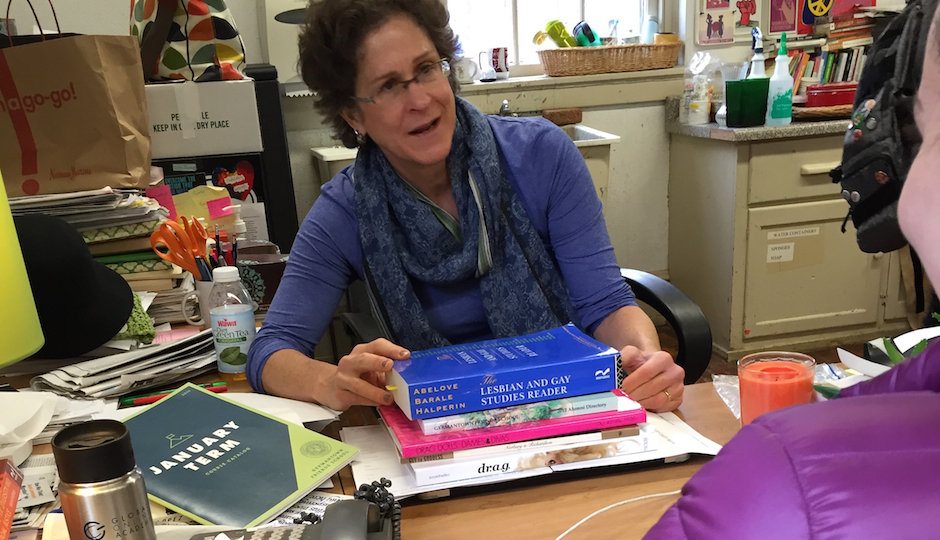A First for Philly Schools: A High School Course in Drag

Germantown Friends School teacher Sara Gordon with some of the books she’s using in the school’s first-ever drag class.
Germantown Friends is not your average Philadelphia school. A four-year high school education there will set you back more than $130,000 — about the same as a bachelor’s degree from Temple University, including room and board at Temple. And the students at the prestigious Quaker school aren’t just learning reading, writing and ‘rithmetic.
The course offerings at Germantown Friends run the gamut. This term, a freshman might choose a crash course in meteorology, a primer in 3D printing and design, or a how-to on making an elevator pitch. And for the first time in its 170-year history, Germantown Friends School is offering an introduction to the gender-bending performance art known as drag.
“From the Renaissance to RuPaul: A Brief Exploration of Drag” was the idea of Germantown Friends high school English teacher Sara Gordon, who has taught there for 10 years. The class meets twice a week, on Mondays and Wednesdays. We couldn’t find an example of another high school anywhere offering a study of drag, and just last year, England got its first university-level course in the subject.
“It shows that this form of expression is socially acceptable,” says local drag performer Ian Morrison, whose stage name is Brittany Lynn. “This kind of class also helps with self-acceptance for the LGBT kids in the area.”
Gordon is not a drag performer, but she has spent a lot of time volunteering at the ATTIC Youth Center, the Philadelphia non-profit and community center dedicated to LGBTQ Youth, where drag performances among the children are encouraged.
“I’ve watched what drag can do for young people,” she says. “They are so withdrawn and shy and uncomfortable in their bodies, almost trying to disappear. But then they join the drag group [at ATTIC], and they slowly take on this persona — more confident, more flamboyant. They embrace this part of themselves and show it off.”
Gordon’s first exposure to drag came at an age similar to her students. It was a girlfriend’s 14th birthday, and her mother took the girls to a place called the Boom Boom Room on the 1300 block of Walnut Street. “It was people doing Liza Minnelli and Marilyn Monroe,” she remembers. “The performers were so happy to see a family there. They were so nice to us.”
Although Gordon hasn’t taught a drag class at Germantown before, the subject has come up repeatedly. “I do an intensive intro to gender theory,” she explains. “And we always wind up talking about drag.”
During the gender theory course, a friend of Gordon’s came in with a presentation that included a video of Christeene, a Texas-based drag queen more influenced by punk music and slasher films than anything resembling Ru Paul. While much of today’s drag has gone mainstream, Christeene’s particular brand of “drag terrorism” is still very much in the fringes. It’s not for the faint of heart.
“But it was the highlight of the course,” says Gordon. “All of the students were talking about it. Some of them didn’t get it, but the kids who got it were almost speechless. You could see the wheels turning.”
For the new course, the students’ first assignment was to look up a bunch of otherwise mundane terms and find out what they mean in the context of drag: “tuck,” “squirrel,” “fishy” and “packing” are some examples.
Gordon also brought in two coffee table drag photo books and showed the students some videos of drag performers doing their thing.
“I wanted them to know that it’s not just people dressed up as Mae West,” she explains. “It’s not just putting on a costume and going home. Look at Marsha P. Johnson‘s role in Stonewall or Panti Bliss in Ireland’s gay marriage battle or Christeene. Drag can be a really powerful statement about the way our society works, a resistance in a way.”
During one of the first meetings of the class, the group sat down to view a long video but wound up watching less than 10 minutes of it, because everyone wanted to talk about what they were seeing. For the remaining hour-plus, the students and teacher delved into such topics as the male gaze, phallocentrism and slut shaming.
“One girl pointed out that a female performing in a certain way would be ‘slutty,'” says Gordon. “But when a drag queen does it, it’s funny. It’s a way to get at interesting concepts that wouldn’t otherwise come up.”
While some parents, teachers and administrators at some schools might raise an eyebrow about high school students learning about drag, Gordon insists that’s not the case at this particular school.
“Germantown Friends is a very liberal bubble,” she says. “I could have taught this course here 10 years ago … There are no dangerous ideas. When presenting an idea that stretches a kid’s concept of what gender is, not one grain of me can think of anything bad about that. It’s an open discourse.”
And Gordon points out that this isn’t a how-to course in becoming a drag performer, and dress up is no way required.
“But they certainly can if they want to,” says Gordon. “I think of it as a really wholesome activity for young people.”
Follow @VictorFiorillo on Twitter.


